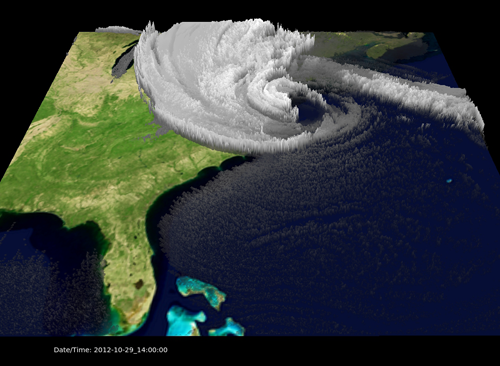UCAR to support EarthCube: Cyberinfrastructure will advance science
Advances in cyberinfrastructure will improve understanding of Earth
May 26, 2016 - by Staff
May 26, 2016 - by Staff
BOULDER – EarthCube, a landmark initiative to develop new technological and computational capabilities for geosciences research, will be supported by the University Corporation for Atmospheric Research (UCAR) under a new agreement with the National Science Foundation (NSF).
Created by NSF in 2011, EarthCube aims to help researchers across the geosciences from meteorology to seismology better understand our planet in ways that can strengthen societal resilience to natural events. More than 2,500 EarthCube contributors – including scientists, educators, and information professionals – work together on the creation of a common cyberinfrastructure for researchers to collect, access, analyze, share, and visualize all forms of data and related resources.
"EarthCube offers the promise to advance geoscience research by creating and delivering critical new capabilities,” said UCAR scientist Mohan Ramamurthy, principal investigator and project director of the new EarthCube office at UCAR.
"This is a great opportunity for UCAR to leverage its successful track record in managing large scientific projects that advance our understanding of the planet," said Michael Thompson, interim UCAR president. "The EarthCube project offers the potential to significantly benefit society by helping scientists use the power of diverse big datasets to better understand and predict the natural events, from severe storms to solar disturbances, that affect all of us."

EarthCube is designed to foster collaborations across the geosciences. The technology helps scientists in different disciplines better understand the far-reaching influences of natural events, such as how major storms like Sandy (above) affect coastal and inland flooding. This unique view of Sandy was generated with NCAR's VAPOR visualization software, based on detailed computer modeling. (©UCAR. Visualization by Alan Norton, NCAR, based on research by NCAR scientists Mel Shapiro and Thomas Galarneau. This image is freely available for media & nonprofit use. Click here for higher resolution.)
UCAR will administer the day-to-day operations of EarthCube under the three-year, $2.8 million agreement with NSF. The EarthCube science support office, currently funded through an NSF grant to the Arizona Geological Survey in Tucson, Arizona, will move to UCAR's Boulder offices starting this month.
EarthCube is designed to help researchers across the geosciences address the challenges of understanding and predicting the complexity of the Earth system, from the geology and topography to the water cycle, atmosphere, and space environment of the planet. This approach is critical for improved understanding of the environment and better safeguarding society.
In order to better predict the potential effects of a landfalling hurricane on inland mudslides, for example, scientists from multiple disciplines, including meteorology, hydrology, geography, and geology, need a common platform to work together to collect observations, ingest them into advanced computer models of the Earth system, and analyze and interpret the resulting data.
"The EarthCube Science Support Office will help us find and share the data geoscientists collect and use to answer critical science questions about the Earth," said Eva Zanzerkia, program director in NSF’s Division of Earth Sciences.
Ramamurthy said UCAR is well positioned to help EarthCube meet its goals, since UCAR provides technological support to the geosciences community, including its 109 member universities. UCAR has been involved with EarthCube since NSF launched the initiative.
"Currently researchers are spending an enormous amount of time on routine tasks because there is no data system, database, or data infrastructure where they can get all the information they need in some kind of a uniform way from a single interface," Ramamurthy said. "If EarthCube can facilitate the integration of data from multiple domains in a way that is easier and faster, and if there is interoperability in terms of standards for data to be input into a common environment, then integration becomes more easily possible."
UCAR is a nonprofit consortium of more than 100 member colleges and universities focused on research and training in the atmospheric and related Earth system sciences. UCAR’s primary activity is managing the National Center for Atmospheric Research (NCAR) on behalf of NSF, NCAR’s sponsor. UCAR also oversees a variety of education and scientific support activities under the umbrella of the UCAR Community Programs, which will administer EarthCube.